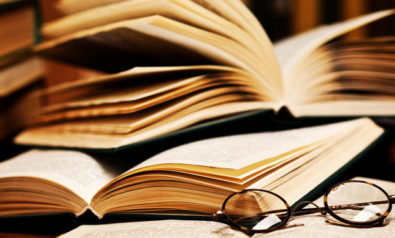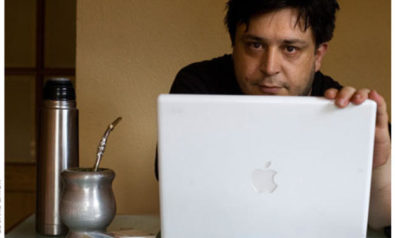In conversation with writer Yahia Lababidi, Yuna Rault-D'Inca finds out about the creative process behind the art of aphorisms.
Yuna Rault-D'Inca: Please explain to us, what exactly is an aphorism and in what way can they be poetic? And I challenge you to summarize the answers to each question in a suitable aphorism.
Yahia Lababidi: Aphorisms are what is worth quoting from the soul’s dialogue with itself. As with poetry, these complete fragments seek to make every word matter and to contain an inbuilt music, so that they might be better remembered.
“Impulses we attempt to strangle only develop stronger muscles.”
Rault-D'Inca: Do you abide by James Geary’s five laws to create an aphorism: brief, personal, definitive, philosophical — a certain twist?
Lababidi: With all due respect, I think that to define is to limit. Aphorisms are laws unto themselves, and the good ones surprise the writer as much as the reader. Also, I’m wary of being “definitive” about anything really, and believe rigidity is the need to conclude. I prefer that a thought be open-ended.
“Time heals old wounds only because there are new wounds to attend to.”
Rault-D'Inca: What is your own definition of an ideal aphorism and what are "other tailored thoughts"? Can you demonstrate on an example?
Lababidi: An ideal aphorism continues to work on us long after we’ve read it. It challenges our world-view, self-image, and tenderly incubated biases.
“Spirituality occurs at the boiling point of religion, where dogma evaporates.”
Rault-D'Inca: You began to write aphorisms more than twenty years ago. How did you become interested in this literary form which most of us imagine to rather being a preferential way of expression used by wise men with white beards?
Lababidi: I am equally attracted to wit as I am to wisdom in writing, and found both in the great aphorists I grew up reading: Wilde, Nietzsche, Goethe, Blake, La Rochefoucauld, Pascal, Kafka, etc. Writing aphorisms was my way of talking back to my heroes. In fact, some time back, I’m quite proud to say, I published a collection of conversations in collaboration with Alex Stein, called The Artist as Mystic, where I return to my literary masters to explore the sacred dimension of much of this type of writing.
“Miracles are proud creatures; they will not reveal themselves to those who do not believe.”
Rault-D'Inca: Are professional aphorists serious men? Do you need to be drunk to create?
Lababidi: What a strange question. “Serious” can be a dull word, in the sense of “humorless.” That said, I do believe in serious play. As far as “drunkenness,” I’ll let Baudelaire answer this:
“Be always drunken.
Nothing else matters
…
With wine, with poetry, or with virtue, as you will.
But be drunken.”
“Pleasure, not joy, may be snatched from life’s clenched fists.”
Rault-D'Inca: Can aphorisms be fun? Give us an example of a fun way to express something in an aphorism?
Lababidi: I certainly hope so! Here’s some that I hope might tickle you:
“Marrying for looks is like buying books for their pictures – a good idea, if one cannot read.”
“Like cars in an amusement park, our direction is often determined through collision.”
“Temptation: seeds we are forbidden to water, that are showered with rain.”
Rault-D'Inca: Does one need to be particularly educated to understand the subtle meaning of an aphorism, or even to create one? And are they also suitable as a sort of street poetry?
Lababidi: I like that you compare them to street poetry. One only needs to be educated in human nature and life to appreciate an aphorism. In fact, growing up in Egypt, where wit was a kind of sport and national pastime, it was quite common to hear illiterate people speaking almost exclusively in sayings and proverbs. We even have a saying, in Arabic, that justifies this and basically translates as: “Knowledge is what is in your head, not what is in your notebooks.”
"Take two opposites, connect the dots, and you have a straight line."
Rault-D'Inca: Why did you translate your aphorisms into German?
Lababidi: To date, I’ve been very fortunate to have had my writing translated into several languages: Arabic, Hebrew, Slovak, Spanish, Italian, Dutch, Swedish and Turkish. But I will say that German was a special treat for me, since I was deeply marked by German philosophy and poetry (Nietzsche and Rilke mean the world to me). Stefan Lenkisch, the German translator, was a gift from the universe, recommended by a mutual friend of ours that I met online. It would be great, at this point, to find a German publisher that is willing to print a complete translation of my first book (of aphorisms), Signposts to Elsewhere.
“Eye contact: how souls catch fire.”
Rault-D'Inca: Do you think there is a language which is best suitable for aphorisms, because it is more clear, more poetic, or because of its sound?
Lababidi: I’m not sure about that. Much as I adore language, and testing its elasticity, the more one works with it, the more one realizes its limitations. I’m beginning to believe (and forgive me if this sounds too esoteric) that only a fraction of a poem or aphorism’s power resides in its skin, that is to say words. The rest belongs to the spirit that swims through it. As a Buddhist might say, language is merely a finger pointing at the moon.
“Only after we have mastered a thing are we beyond it; this is true of bodies, emotions, even words.”
Rault-D'Inca: In what way do you think aphorisms are a literary expression especially suitable for today’s means of communication – especially Twitter? Have we reached an age of aphorisms?
Lababidi: Aphorisms seem to require little of our time and attention, but actually reward patience and careful reading — so they’re deceptive that way. In one sense, yes, they’re perfect for this telegraphic age — Twitter especially, where one is forced to compress thinking and practice into an economical style. But, at the same time, they are something more than sound bites, or one-liners and, as quite a few of us know, it is often harder to synthesize or be brief than to be long-winded.
“With enigmatic clarity, Life gives us a different answer, each time we ask her the same question.”
Rault-D'Inca: What do you think is the better form to communicate an aphorism — oral or written?
Lababidi: Again, hard to say. As a form of poetry or wisdom writing — or even story telling — aphorisms address themselves to the ear, and so belong to the oral tradition. But, they also benefit greatly from private meditation. Ideally, I’d prefer to read a series of aphorisms on my own, and think about them, before they are read out to me.
“The thoughts we choose to act upon define us to others; the ones we do not define us to ourselves.”
Rault-D'Inca: How would you suggest one read a collection of aphorisms – such as your own Signposts from Elsewhere? There is no real story. So should we read one a day or all at once, or on a special occasion?
Lababidi: Thoughtfully, and chewing slowly is probably the best way to consume a collection of aphorisms; otherwise we may give ourselves indigestion. There’s a reason there’s only a few aphorisms per page (in my book) and that is to give them space to breathe, or room for us to unpack them, comparing/contrasting these ideas with our own life experience. Strange to say, Signposts was written at a very young age, between 18-21, and after that I did not really write aphorisms for nearly a decade or so. Only recently, have I broken this aphoristic silence and begun writing them again. I suspect my style, and concerns have changed somewhat. Here’s a peek at my latest:
“Self-image: self-deception.”
Rault-D'Inca: Short messages, the futility of the net, poetry slamming rhapsodies in the clubs: do you think “serious” and at times lengthy paper-based literature, as we knew it growing up, still has a future? In this fast moving world, are we more than ever in need of poetry? What is your own vision of the literature of the future?
Lababidi: Again that problematic word, “serious.” To begin at the end of your questions: Yes, we are in need of slowing down, and poetry, aphorisms, or nature can do this for us, by helping us to pause and reflect. But, I do not think the brief arts threaten the longer forms, or that the virtual world need be seen in opposition to the real. There will always be room for books; only they seem to migrate from paper to screens, which is fine. It seems futile to fight technology and the inevitable changes that come with it in how we think and interact. So, I refuse to panic or lament. I don’t see literature to be in a critical condition or dying simply because it is vital to our well being as a species, and I firmly believe it is just as difficult not to dream by day as it is not to dream by night. Literature, and the impulse to create, will continue to live and change shape as long as we humans do.
“All must pass, if we do not first.”
The views expressed in this article are the author's own and do not necessarily reflect Fair Observer’s editorial policy.
Image: Copyright © Shutterstock. All Rights Reserved.
Support Fair Observer
We rely on your support for our independence, diversity and quality.
For more than 10 years, Fair Observer has been free, fair and independent. No billionaire owns us, no advertisers control us. We are a reader-supported nonprofit. Unlike many other publications, we keep our content free for readers regardless of where they live or whether they can afford to pay. We have no paywalls and no ads.
In the post-truth era of fake news, echo chambers and filter bubbles, we publish a plurality of perspectives from around the world. Anyone can publish with us, but everyone goes through a rigorous editorial process. So, you get fact-checked, well-reasoned content instead of noise.
We publish 2,500+ voices from 90+ countries. We also conduct education and training programs
on subjects ranging from digital media and journalism to writing and critical thinking. This
doesn’t come cheap. Servers, editors, trainers and web developers cost
money.
Please consider supporting us on a regular basis as a recurring donor or a
sustaining member.
Will you support FO’s journalism?
We rely on your support for our independence, diversity and quality.












Comment